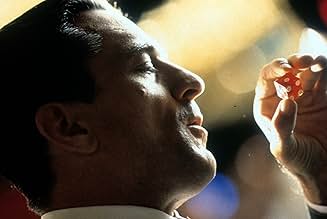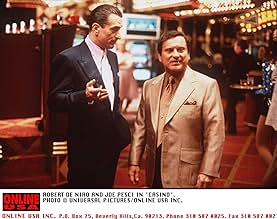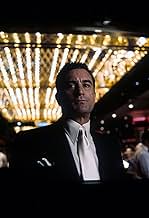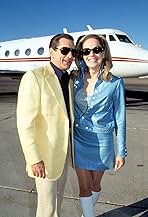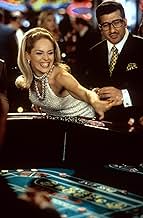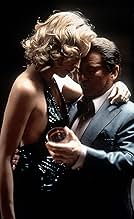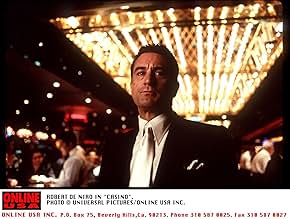Habgier, Betrug, Geld, Macht und Mord sind die Dinge, die die enge Freundschaft zwischen einem Mafia-Vizeboss und einem Kasinobesitzer bestimmen, denn es geht um eine Vorzeigefrau und die He... Alles lesenHabgier, Betrug, Geld, Macht und Mord sind die Dinge, die die enge Freundschaft zwischen einem Mafia-Vizeboss und einem Kasinobesitzer bestimmen, denn es geht um eine Vorzeigefrau und die Herrschaft über ein Glücksspielimperium.Habgier, Betrug, Geld, Macht und Mord sind die Dinge, die die enge Freundschaft zwischen einem Mafia-Vizeboss und einem Kasinobesitzer bestimmen, denn es geht um eine Vorzeigefrau und die Herrschaft über ein Glücksspielimperium.
- Für 1 Oscar nominiert
- 4 Gewinne & 11 Nominierungen insgesamt
- Dominick Santoro
- (as Phillip Suriano)
Zusammenfassung
Empfohlene Bewertungen
Perhaps, with Kubrick's passing, Scorsese became the greatest filmmaker on the planet. "Casino" is just an unbridled jolt of cinema, a three hour movie that feels like an hour and a half, a breakneck pace that still allows for rare depth in its performances and characterisations. It's the best performance Sharon Stone ever put in; after the ridiculous "Basic Instinct" and "Sliver", they could have written her off if not for this. Her character's arc is tremendous.
More than anything, "Casino" is a showcase of what Pauline Kael called "film sense", that implacable quality that all great directors have. Like Spielberg and Kubrick, Scorsese has a gift for knowing exactly what shot should follow which, is an absolute master of camera movements, angles, framing such that the movie streaks across the screen like fast-moving water over rocks, never once stalling or slowing down.
It's brilliant, but it's not up with the director's greatest work like "Taxi Driver", "Raging Bull", or "Hugo", which is a truly underrated masterpiece. It's a notch below, but when Scorsese is a notch below his best, he's still streets ahead of everybody else.
But I don't think that Casino is at all a "perfect" film. An 8 out of 10 may seem high, but if you're familiar with my reviews, you'll know that it's not that high of a score from me--it's closer to average from me. There are plenty of flaws here, and I'm going to spend some time pointing them out, particularly since the film receives so many 10's.
Casino is based on the story of Frank "Lefty" Rosenthal and the Stardust casino in Las Vegas. The Rosenthal character is here named Sam "Ace" Rothstein and is played by De Niro. The hotel became the Tangiers for the film. The mob backs Rothstein but has to set up a false front while Rothstein "secretly" runs the hotel, because of his gambling charges back East. He falls in love with and marries former hooker/call-girl and current Vegas hustler Ginger McKenna (Stone), who remains in love with her pimp, Lester Diamond (Woods). Meanwhile, mob strong-arm Nicky Santoro (Pesci) heads out to Vegas to protect Rothstein, but eventually ends up running his own rackets and trying to effectively take over the town. Casino is the story of the relationship and political problems that this cast of characters and a number of associates run into. It's roughly a gradual road to destruction for everyone involved.
The film is unusual in many ways. The most prominent oddity is that a large chunk of it is told via alternated narration from the two main characters, Rothstein and Santoro. The aim was probably to include a lot more of Pileggi's book, in a more literal way, than would have been possible through more conventional means. It's remarkable that the narration works as well as it does, especially because a lot of it is given a rapid-fire delivery. For at least the first 15 minutes, there is barely a pause in the narrational dialogue.
One of the reasons it works is because of the style that Scorsese uses to accompany it in the opening. He employs a lot of fast cuts while presenting very stylized, documentary-like footage. The opening feels as much like an entertaining behind-the-scenes look at how the typical casino works as it feels like a fictional film about gangsters.
Eventually, the film evolves from almost 100% narration to almost no narration (although the narration never completely leaves the film). This happens so subtly that one hardly notices. Scorsese's directorial style likewise evolves from the fast-cut documentary approach to something more conventional.
This is all well and good, but on the other hand, the gradual evolution can only happen because the film is so long--it clocks in just a couple minutes shy of 3 hours. That's a bit too long for the story being told. By at least the halfway point, it starts to feel a bit draggy. All the material is necessary to the story, but it could have been tightened up a lot more.
Another unusual aspect is the score/soundtrack, which consists primarily of pop hits from a wide time span--30 years or more. While I like the songs--I've owned the CD since it came out and I listen to it often enough--and the songs can help set the mood for some scenes, they become a bit too incessant and overbearing for the story after awhile. It begins to approach the dreaded "mix tape" mentality, where the songs are just there because the director wanted to share some bitchin' tunes that he likes a lot. A bit of ebb and flow with the music, and music better correlated to the drama, would have worked even better.
Presumably, Scorsese was shooting for something like a sensory assault, since that's what you get in Vegas. The visuals are filled with neon lights, flashy clothes (I love Rothstein's suits), flashy people and such. The soundtrack is probably meant to match. But in that case, if I were directing, I think I would have went for a combination of commissioned music that incorporated a lot of casino sounds, or that mimicked a lot of casino sounds--the cacophonous electronic symphony of various machines constantly going through their modes--with schmaltzy show tunes, ala Liza, Jerry Vale, Tom Jones, Wayne Newton, etc.
That Scorsese was trying to give a Vegas-styled sensory assault is also supported by the audio-visual contrast between the Vegas scenes and the scenes in other locations, such as Kansas City. So I can understand the motivation, but I'm not sure the final result exactly worked.
Of course the performances are exceptional, even if everyone is playing to type, except for maybe Woods. The plot and characters are written and performed so that the viewer can see the disasters coming way before the characters can--and that's how it should be. For example, as a viewer, you know as soon as it starts that it's a bad idea for Rothstein to kowtow to McKenna to win her hand in marriage, but Rothstein is blind in love and he ends up paying for it. Everything unfolds almost a bit predictably in this respect, and another slight flaw is that we're shown the penultimate moment of the film right at the very beginning. It tends to make it feel even more stretched out, as you keep anticipating that scene.
But the slight flaws shouldn't stop anyone from seeing this film, and of course, quite a few viewers feel that there are no flaws at all.
The film is unusual in that it has two leading men with parallel stories. Sometimes Ace and Nicky (Robert De Niro and Joe Pesci) were in scenes together....often they were apart...each doing his own thing. As for Ace, he was a smart man who was in charge of one of Vegas' top casinos. He was tough...but basically honest for a mobster. As for Nicky, as you'd expect with a Joe Pesci character, he's a bit of a nut-job....often out of control and letting anger govern most of his decisions. Unlike Ace who had a veneer of honesty about him, Nicky was a hood...and didn't mind this. Eventually, the pair end up having a downfall. How and what happens to each you'll have to see for yourself.
The parts of this film I enjoyed the most were when you learned about how Vegas operated. Seeing Ace dealing with crooked gamblers was especially interesting. And, in this sense, I enjoyed the film much more than "Goodfellas"...also with the same stars and same director. This is because "Goodfellas" was mostly just about violence and crime...whereas "Casino" seemed to have more story and wasn't always about excessive violence and nastiness...not that the film is in any way a 'nice' picture. It's filled with obscenities, nasty folks and a few scenes of horrific violence. Think about this before you decide whether or not to see the movie.
By the way, this is only a personal choice and doesn't really affect the movie much, but one thing I did not love about the film is the omnipresent pop music....which at times made the film seem like a music video. I think less of this would have been nice.
What Scorsese Film Ranks Highest on IMDb?
What Scorsese Film Ranks Highest on IMDb?
Wusstest du schon
- WissenswertesMost of the conversations between Robert De Niro and Joe Pesci were improvised. Martin Scorsese would tell them where to start and where to end. The rest was up to them.
- PatzerThe sound of shoes walking on floorboards is heard in the bedroom when Ginger returns to Ace after he threw her out of the house. The bedroom is carpeted, so Ginger's shoes shouldn't have made any sound.
- Zitate
Ace Rothstein: [to Don] Listen to me very carefully. There are three ways of doing things around here: the right way, the wrong way, and the way that *I* do it. You understand?
- Crazy Credits"This is a fictional story with fictional characters adapted from a true story."
- Alternative VersionenFinnish VHS release is cut by 1 minute. Notable cuts were:
- Tony Dogs being tortured with the vice
- Baseball bat killings
- VerbindungenFeatured in Cops (1994)
- SoundtracksMatthäuspassion BMV
Composed by Johann Sebastian Bach (uncredited)
Performed by the Chicago Symphony Orchestra
Conducted by Georg Solti (as Sir Georg Solti)
Courtesy of the Decca Record Company Limited, London
by Arrangement with PolyGram Film & TV Licensing
Top-Auswahl
Everything New on HBO Max in June
Everything New on HBO Max in June
Details
Box Office
- Budget
- 52.000.000 $ (geschätzt)
- Bruttoertrag in den USA und Kanada
- 42.512.375 $
- Eröffnungswochenende in den USA und in Kanada
- 9.946.480 $
- 26. Nov. 1995
- Weltweiter Bruttoertrag
- 116.112.375 $
- Laufzeit2 Stunden 58 Minuten
- Farbe
- Sound-Mix
- Seitenverhältnis
- 2.39 : 1
Zu dieser Seite beitragen






